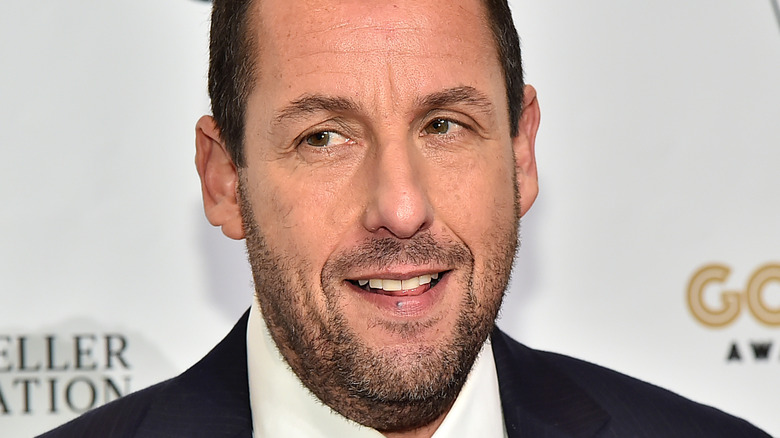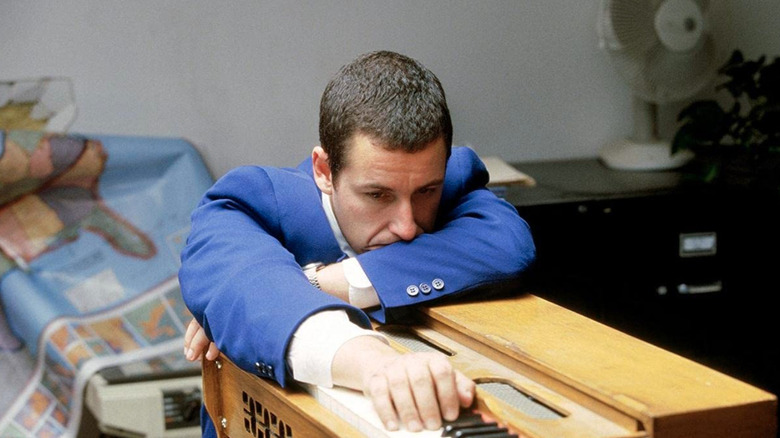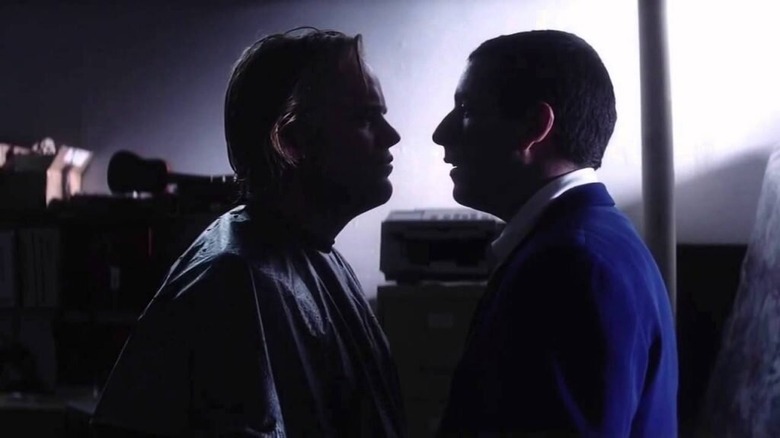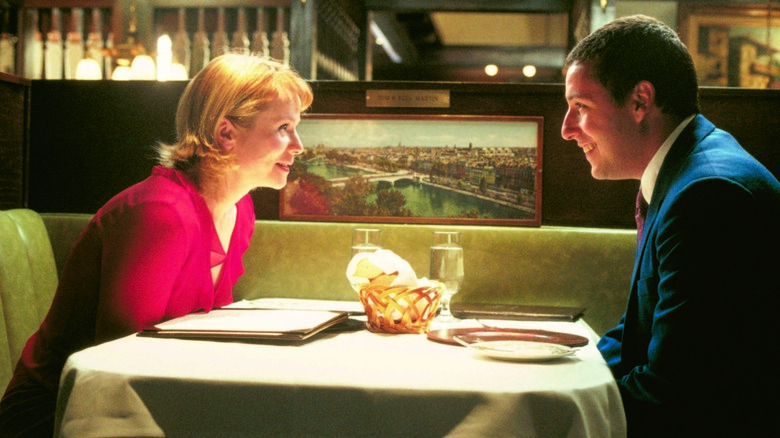One Adam Sandler Comedy Stands Above The Rest, And It's Not Even Close
Anyone who has seen "Uncut Gems" knows that Adam Sandler is a pretty good dramatic actor when he wants to be. However, as anyone who's seen some of his less than ambitious comedies knows, his endeavors in the land of funny can be rather painful. Movies like "The Ridiculous 6" — a movie with a rare zero percent Tomatometer rating on Rotten Tomatoes – can be pretty wild to watch when you know that the star can do so much better. It's even wilder to remember that just a few years ago, Sandler's career was falling apart because of a long string of cookie cutter comedies that were uninspired and needlessly expensive for what they were.
Don't let stuff like "Uncut Gems" make you think for a second that Sandler's just one of those comedy actors who can sometimes surprise us in a serious role, though. When he decides to deploy his comedic sensibilities a bit more tactically than usual, he's every bit as effective in comedies. In those moments, you might see him in stuff like the award-winning (via IMDb) and critically lauded (via Rotten Tomatoes) ensemble comedy-drama "The Meyerowitz Stories (New and Selected)."
This information has actually been available for a pretty long while, since the best Adam Sandler comedy out there premiered no less than two decades ago. The movie is 2002's "Punch-Drunk Love," and if you haven't seen it, give it a chance. The words "Adam Sandler romantic comedy from the early 2000s" might be a bit dubious on paper, but this one is no ordinary rom-com.
An Adam Sandler character stuck in a Paul Thomas Anderson movie
First thing you need to know about "Punch-Drunk Love" is that its writer and director is one Paul Thomas Anderson, in the middle of what might very well be one of the hottest streaks in Hollywood history. His two movies before this one were "Boogie Nights" and "Magnolia." His two next films? "There Will Be Blood" and "The Master."
As its Rotten Tomatoes rating readily shows, "Punch-Drunk Love" isn't just some wacky vanity project Anderson made to catch his breath between critically-praised "real" films. It's a complex story of emotions and the inability to express them. Sandler's Barry Egan may look and act like your average Adam Sandler protagonist, to the point that he owns a novelty plunger business and has lofty plans that center around pudding. However, the genius of the film is that its hero is an Adam Sandler character ... who's stuck in a Paul Thomas Anderson movie.
Whatever Sandlerian slapstick manchild tendencies Barry might have in another movie, Sandler and Anderson deconstruct here into a realistic version of the "downtrodden goofy protagonist" archetype. The end result is a lonely, seething, barely functional ball of frustration and (mostly) suppressed rage, and Sandler is very, very good in the role.
Oh, the movie still has meddling siblings, typical rom-com misunderstandings, low-stakes villains, and plenty of laughs. However, you'll be surprised how often the laughter is that very specific kind where you just have to chuckle out of sheer disbelief.
A role so good, it makes Sandler's bad films seem better
Sandler's surprisingly complex turn as Barry might be the single biggest shock "Punch-Drunk Love" delivers, but the comedian is just the tip of the movie's talent iceberg. Sandler acts opposite the esteemed Emily Watson, who had two Oscar nods under her belt when she appeared in the film (via IMDb). Anderson's frequent collaborators Philip Seymour Hoffman and Luis Guzmán also make memorable appearances. The presence of these greats works in favor of Sandler. The drama between Barry and Dean the Mattress Man, in particular, shows just how well the comedian can hold his own against an actor of Hoffman's considerable stature.
Despite all this, Sandler is still decades removed from the weathered "Uncut Gems" stage of his career — a fresh-faced young buck whose visage is more easily associated with films like "Little Nicky." As critic Roger Ebert pointed out when the movie came out (via RogerEbert.com), the end result is so jarring that it can actually make you like Sandler's goofier comedies more.
"In voice and mannerisms he is the same childlike, love-starved Adam Sandler we've seen in a series of dim comedies, but this film, by seeing him in a new light, encourages us to look again at those films," Ebert's review described the viewing experience. "Given a director and a screenplay that sees through the Sandler persona, that understands it as the disguise of a suffering outsider, Sandler reveals depths and tones we may have suspected but couldn't bring into focus."
Punch-Drunk Love is an early example of how good Sandler can be when he feels like it
As previously mentioned, Adam Sandler can be a brilliant actor. All that goofiness he brings to his low-end fare? He can turn it into a strength at the drop of a hat by adjusting the volume button and fine-tuning the nuances of his performance. This is the exact reason Sandler was cast in "Uncut Gems" – the Safdie brothers homed in on him because they felt he could weaponize his comparatively family-friendly comedian qualities in the lead role (via Vox). "So we knew that we needed a character who you loved, who had this patriarchal quality, who was lovable and could be grounded in absurd scenarios," Josh Safdie said. "And from the very beginning, we knew it was Adam Sandler." This is quite likely the reason Quentin Tarantino originally wanted Sandler in the role of the fearsome Donny Donowitz in "Inglourious Basterds," as well.
There are several good Sandler movies, which seem to turn up whenever the actor decides to apply himself. Most recently, he delivered a slam-dunk performance in "Hustle" as jaded basketball scout Stanley Sugerman. Back in 2002, however, "Punch-Drunk Love" came out in the middle of the actor's lengthy stretch of nigh-uninterrupted, critically lambasted goofiness, which means it can be easy to write off as a mere blip in the radar during an era where his output mostly consisted of "certified rotten" fare.
This makes the movie all the more effective: You're seeing that Adam Sandler from that era of his comedy-making, so you're not ready for the seething, barely contained ball of rage that hides just behind his amiable eyes. And you're definitely not ready for how wildly entertaining he still manages to make the angry, sad Barry Egan.



